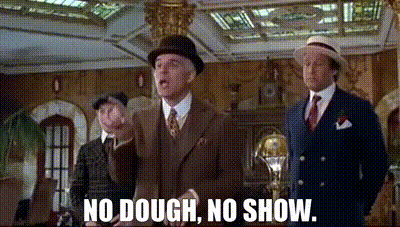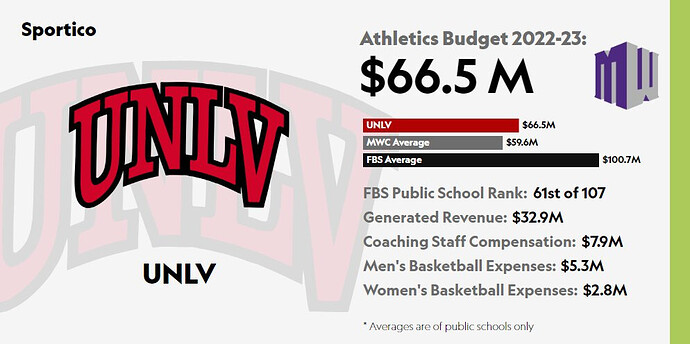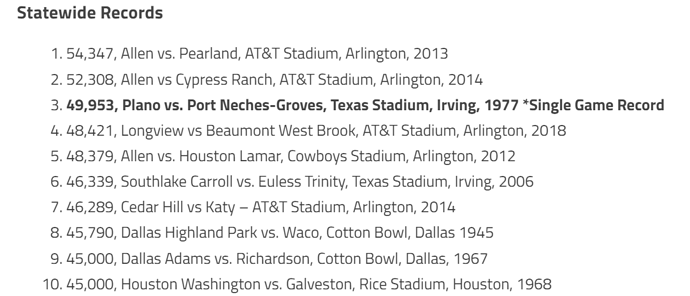Had to dig deep into the memory banks for passers with 40-45% completion percentages.
If it’s the university failing to uphold agreed to terms than shame on them.
If the kid is trying to change terms based on performance than shame on him. There’s a right and a wrong way to do that and (if true) what he is doing is the wrong way.
This sport dynamic has changed so much based on the $. I don’t mind players getting paid and support it.
They tried to simply say “no” for the last two decades. They didn’t “cave” because of pressure from fans or media. They changed the rules because they kept losing in court. Because judge after judge after judge told them the same thing: “You are a multi-billion-dollar media business, not a charity, and you have no right to collude to prevent adults from getting paid the going rate for their talent and work if the institutions making those billions want to pay them.”
The NCAA and power conferences can try to change the law (they’ve failed so far), or they can stop running their business as an illegal cartel (or be forced to). Those are the only options. What you’re demanding is that they return to the plug-your-ears-and-say “la la la I can’t hear you” stage of this process.
I mean I completely see your point.
But is this not the same for pro players or is it OK for them to leave in free agency?
And yes I am being sarcastic.
My point is a deal was struck. The powers that be at the school have not held up their end of the deal. You are bringing 1970s thinking into this. That these pro athletes and yes they are pro athletes just in the minors did not get paid. The colleges have benefitted greatly financially from this sport and the players have been paid peanuts while say the coaches were getting paid millions
Now I agree with the problem of guys jumping teams as a huge problem and a dissatisfaction in the game.
Yep, breach of contract.
The kid is in the right, although it’s a good lesson to get everything in writing.

Some more context…
So a coach on UNLV’s $8 million staff told a guy in Massachusetts that if he picked up his life and moved across the country to play for them, instead of one of the other schools that were offering him an NIL deal, they’d pay him $100,000. (That is, less than two tenths of 1% of the school’s athletic budget, or 1.2% of what UNLV pays its coaches.) He agreed and passed on other offers. Now the school is shrugging and saying, Sorry, we don’t have the money to keep our promise. But the player is the one who has no loyalty??? He held up his end of the bargain, taking the team to 3-0, and in return the school scammed him out of 100 grand!
So, serious question what is the status of amateur athletics in the Olympics? Seems like if you are “The Dream Team” then ok you are both millionaires and Olympic athletes. But you guys over here… nope purity of the game and you can’t go pro and be in the Olympic games. Fair points on losing in court. Just seems odd that la la la la la worked since New Jersey v Rutgers circa 1869 until just now. If you are an 18 year old HS football player do you have to get paid minimum wage if the game is broadcast on TV? Inquiring minds…
As you spend 50hours a week doing something you don’t want to do for a paycheck
How does that eggplant ![]() taste
taste
Olympic sports are one of the big open questions. Although in theory at least, NIL was supposed to mirror the Olympics model, where players can generate money from sponsorships and endorsements, even if they’re not getting directly paid.
As far as what’s changed recently since 1869, it’s just the money that big-time college sports generates. The SEC just signed a $3 billion deal with ESPN. The Big Ten’s last TV deal in 2022 was for $7 billion, though it’s poised to increase now that they’ve added the Los Angeles, Washington and Oregon markets.
Tuition plus room and board can be considered reasonable compensation when you’re playing for a school who’s primary business is being a school. (And there are still plenty of US schools where that’s the case.) When you’re playing for a multi-billion-dollar media property, generating hundreds of millions annually for literally everyone else involved in the business except the people directly playing the sport, the “fair compensation” argument gets a little weak.
As Justice Kavanaugh wrote when the Supreme Court ruled (unanimously) that the NCAA was violating anti-trust laws:
"The NCAA’s business model would be flatly illegal in almost any other industry in America. Nowhere else can businesses get away with agreeing not to pay their workers a fair market rate on the theory that their product is defined by not paying their workers a fair market rate.
All of the restaurants in a region cannot come together to cut cooks’ wages on the theory that ‘customers prefer’ to eat food from low-paid cooks. Law firms cannot conspire to cabin lawyers’ salaries in the name of providing legal services out of a ‘love of the law.’ Hospitals cannot agree to cap nurses’ income in order to create a ‘purer’ form of helping the sick. News organizations cannot join forces to curtail pay to reporters to preserve a ‘tradition’ of public-minded journalism. Movie studios cannot collude to slash benefits to camera crews to kindle a 'spirit of amateurism” in Hollywood.
Price-fixing labor is price-fixing labor. The current NCAA model is suppressing the pay of student athletes who collectively generate billions of dollars in revenues for colleges every year. Important traditions that have become part of the fabric of America cannot justify the NCAA’s decision to build a massive money-raising enterprise on the backs of student athletes who are not fairly compensated."
You pay to get into a HS football game. Do High Schools “collude” to not properly compensate those delivering the product? IE The Left Guard?
The players deserve to be paid, but right now it’s just the wild wild west. There has to be some sort of oversight.
If only there was an organization the schools could create and empower to oversee and enforce NIL agreements. Hmmm… ![]()
![]()
If a bunch of high schools signed a $3 billion TV deal and started charging $200 per ticket and up to get into their games, while requiring that all participating high schools agree not to give athletes a dime, then yes, those schools would be colluding to violate anti-trust law and operating an illegal cartel.
This is basically what the NCAA and conferences are trying to implement with their “NIL clearinghouse” idea in the House settlement, but the judge said that’s still an illegal restriction on players’ ability to earn market-rate compensation, and told them to go back to the drawing board.
So again, the NCAA has a choice: they can beg Congress to grant them an anti-trust exemption (which so far Congress has been uninterested in doing), or they can enter collective bargaining with athletes.
The olympic sports are going to pay the price for Bball and Fball NIL deals, it’s already happening. Schools are having to shut down olympic sports as they can’t afford them anymore. Olympics will pay the price in the long term.
So it’s not the process, it’s the disparity at question? That is the difference in right and wrong, or legal and illegal? Meh…
I have no idea what the best way to oversee it would be, way outside my purview. But there’s got to be an organization they can go to when they don’t get paid, just like us. The Department of Labor? A Workforce Commission? Someone, somewhere. Employees generally have some recourse, at least in America.
As long as they have gender neutral break dancing…
I dunno, I’d argue it’s the disparity that makes it cartel-level illegal price-fixing, in a way that it’s not in other scenarios. In your example for instance, 99.99% of high school football programs are nonprofit entities that cost far more money than they generate. The $5 you pay to get into a HS football game covers some of those costs. Nobody is making $3 billion selling the rights to watch a HS left guard play football.
For big-time college football, people ARE making billions of dollars selling the rights to broadcast those games. Because there’s a free market for college TV rights in a way that there’s not for college Oline play, and that’s what the market says those TV rights are worth.
The starting left guard for Alabama (or Georgia, or Michigan, or Ohio State) obviously brings something of value to the table in helping create that billion-dollar product. Somebody would be willing to compensate that guy at a rate closer to his actual market value–except that all of his potential employers, who are splitting up the billions of dollars those TV rights generate, are colluding to prevent that.
I don’t get the prostitute thing. If she finds out there is no money she was promised, why should she continue to give the John, uh, customer his end of the deal when she finds out she won’t get paid? How is that any different than ANY party not honoring their commitments after work has been started. The qb simply expected that promises made to him, just like the prostitute, should be kept and paid and if not BOTH have every right to stop the JOB they are doing and say, “whoa, you have decided to not keep our agreement, ok, then everything stops right here until we figure it out or call it off and go our seperate ways” So why would a prostitute do any differently than anyone else who had a partner in an agreement bail out before the “JOB” was done? Please explain. This qb did EXACTLY what anyone should do if someone you made a deal with tells you they aren’t going to live up to their end they agreed to.
Not a thing wrong with these players being paid when they bring in millions and millions to these schools. These schools have been ripping off the athletes for decades, I am glad that crap is over.

